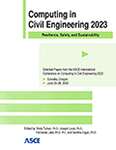Digital Twin-Based Health Maps for Construction Worker Health Monitoring: Assessing Feasibility and Viability
Publication: Computing in Civil Engineering 2023
ABSTRACT
The construction industry is known for its disproportionately high fatality and injury rates, making it one of the most hazardous industries in the US. Despite the significant risks involved, there is a lack of effective health monitoring in construction jobsites. While wearable physiological sensing and artificial intelligence advancements have introduced unique opportunities to assess workers’ health status, there are still inefficiencies in representing that information to support managers’ decision-making. Recently, the concept of digital twin (DT) has been used in various construction applications. Given the exponential growth of its enabling technologies, DT has great potential to transform worker health monitoring in construction jobsites. Therefore, this research investigates the feasibility of integrating workers’ physiological responses with DT technology to generate health maps that deliver workers’ aggregated health information to managers to reinforce their decision-making. The DT-based health maps are expected to enhance workers’ occupational health and safety at construction jobsites.
Get full access to this article
View all available purchase options and get full access to this chapter.
REFERENCES
Ahn, C. R., Lee, S., Sun, C., Jebelli, H., Yang, K., and Choi, B. (2019). “Wearable Sensing Technology Applications in Construction Safety and Health.” Journal of Construction Engineering and Management, 145(11).
Akanmu, A. A., Olayiwola, J., Ogunseiju, O., and McFeeters, D. (2020). “Cyber-physical postural training system for construction workers.” Automation in Construction, Elsevier B.V., 117.
Al-Sehrawy, R., Kumar, B., and Watson, R. (2021). “A digital twin uses classification system for urban planning & city infrastructure management.” Journal of Information Technology in Construction, 26, 832–862.
Aryal, A., Ghahramani, A., and Becerik-Gerber, B. (2017). “Monitoring fatigue in construction workers using physiological measurements.” Automation in Construction, 82, 154–165.
Evers, A., Frese, M., and Cooper, C. L. (2000). “Revisions and further developments of the Occupational Stress Indicator: LISREL results from four Dutch studies.” Journal of Occupational and Organizational Psychology, 73(2), 221–240.
Hou, L., Wu, S., Zhang, G. K., Tan, Y., and Wang, X. (2020). “Literature Review of Digital Twins Applications in Construction Workforce Safety.” Applied Sciences, 11(1), 339.
Jebelli, H., Choi, B., and Lee, S. H. (2019). “Application of Wearable Biosensors to Construction Sites. I: Assessing Workers’ Stress.” Journal of Construction Engineering and Management, 145(12), 1–12.
Jebelli, H., Hwang, S., and Lee, S. (2018). “EEG-based workers’ stress recognition at construction sites.” Automation in Construction, 93, 315–324.
Jebelli, H., and Lee, S. (2019). “Feasibility of Wearable Electromyography (EMG) to Assess Construction Workers’ Muscle Fatigue.” Advances in Informatics and Computing in Civil and Construction Engineering, Springer International Publishing, 181–187.
Lee, D., and Lee, S. (2021). “Digital Twin for Supply Chain Coordination in Modular Construction.” Applied Sciences, 11(13), 5909.
Liu, Y., Habibnezhad, M., and Jebelli, H. (2021). “Brainwave-driven human-robot collaboration in construction.” Automation in Construction, Elsevier B.V., 124(November 2020), 103556.
Liu, Y. K., Ong, S. K., and Nee, A. Y. C. (2022). “State-of-the-art survey on digital twin implementations.” Advances in Manufacturing, 10(1), 1–23.
Lu, Q., Xie, X., Parlikad, A. K., and Schooling, J. M. (2020). “Digital twin-enabled anomaly detection for built asset monitoring in operation and maintenance.” Automation in Construction, 118, 103277.
Opoku, D.-G. J., Perera, S., Osei-Kyei, R., and Rashidi, M. (2021). “Digital twin application in the construction industry: A literature review.” Journal of Building Engineering, 40, 102726.
Park, M. W., and Brilakis, I. (2016). “Continuous localization of construction workers via integration of detection and tracking.” Automation in Construction, Elsevier, 72, 129–142.
Rabeiy, R. E. (2019). “Evaluation of indoor heat stress on workers of bakeries at Assiut City, Egypt.” International Journal of Environmental Science and Technology, 16(6), 2637–2642.
Ricci, J. A., Chee, E., Lorandeau, A. L., and Berger, J. (2007). “Fatigue in the U.S. Workforce: Prevalence and Implications for Lost Productive Work Time.” Journal of Occupational and Environmental Medicine, 49(1), 1–10.
Sharotry, A., Jimenez, J. A., Wierschem, D., Mendez Mediavilla, F. A., Koldenhoven, R. M., Valles, D., Koutitas, G., and Aslan, S. (2020). “A Digital Twin Framework for Real-Time Analysis and Feedback of Repetitive Work in the Manual Material Handling Industry.” Proceedings - Winter Simulation Conference, Institute of Electrical and Electronics Engineers Inc., 2020-December, 2637–2648.
Vrabič, R., Erkoyuncu, J. A., Butala, P., and Roy, R. (2018). “Digital twins: Understanding the added value of integrated models for through-life engineering services.” Procedia Manufacturing, Elsevier, 16, 139–146.
Williams, N. (2017). “The Borg Rating of Perceived Exertion (RPE) scale.” Occupational Medicine, 67(5), 404–405.
Zhao, J., Feng, H., Chen, Q., and Garcia de Soto, B. (2022). “Developing a conceptual framework for the application of digital twin technologies to revamp building operation and maintenance processes.” Journal of Building Engineering, 49, 104028.
Zhou, W., Whyte, J., and Sacks, R. (2012). “Construction safety and digital design: A review.” Automation in Construction, Elsevier, 22, 102–111.
Information & Authors
Information
Published In
History
Published online: Jan 25, 2024
ASCE Technical Topics:
- Business management
- Decision making
- Employment
- Engineering fundamentals
- Feasibility studies
- Geomatics
- Health hazards
- Information management
- Labor
- Mapping
- Methodology (by type)
- Occupational safety
- Personnel management
- Practice and Profession
- Public administration
- Public health and safety
- Research methods (by type)
- Safety
- Surveying methods
Authors
Metrics & Citations
Metrics
Citations
Download citation
If you have the appropriate software installed, you can download article citation data to the citation manager of your choice. Simply select your manager software from the list below and click Download.
